- Home
- Peter Straub
Floating Dragon Page 12
Floating Dragon Read online
Page 12
He did strike her, Richard suddenly knew. That was the meaning of this scene. Les McCloud beat his wife, and poor trapped Patsy let him do it. And a second thought came to him: not a thought but an image. Patsy’s horrified face called back to him the face of a teenage boy staring at him through the window of a Post Road diner.
“Silence means assent. Another weird swamp Yankee,” Les McCloud shouted gleefully.
He would have to repair this rapidly. Laura too had grown more uneasy than anything in the situation called for. “Not exactly,” he said. “Nothing like that, no.”
“Well, what?”
“Just a couple of bad dreams,” he said.
“You ought to see Patsy’s shrink,” Les told him. “Good old Dr. Lauterbach. Or get out on the golf course, take in some fresh air. You golf, don’t you?”
“I’m sorry, but I’m very tired,” Patsy said. She stood up. Her long fingers trembled. Her eyes met only Richard’s, and this time too he understood their plea. Don’t judge us by this. We’re not always this bad. “I must apologize, but please stay on. You’re all having so much fun.” Then a bright brisk smile for everyone, and she left them. Les reached out for her, but Bobo intercepted his hand. “Got to run myself, Les—I’m on twelve to eight tonight.” Then all of them were standing, smiling as falsely as Patsy, trying not to move too obviously toward the stairs.
“Let’s do it again, huh? I guess I shouldn’t have . . . you know. In vino veritas and all that. Come over anytime. We’ll go out for a sail some weekend.”
“Sure, anytime,” Richard said. “As soon as our house is fixed up. Lots of busy weekends ahead.”
Finally they got out the door. The four of them said nothing until they had reached their cars. Ronnie whispered, “Gosh, I’m sorry I got you into this. They seemed so nice whenever I met them before. I don’t know what got into Les. Honestly, he was just terrible.”
Bobo said, “Let’s the four of us get together later, okay? Hey, I never met the guy before. I didn’t know he was a sadist.”
“Yes,” Richard said. “Yes, let’s meet. And yes, he is a sadist. That poor woman.”
“All she has to do is walk out,” Laura said. “Let’s get home. Please.”
RONNI pulled out ahead of them, and Laura moved close to Richard on the front seat of their car. “I can’t stand it, I can’t stand it,” she said. “That man, that fat carnivore. Are these the people we’re going to have to live with? I hate this, Richard—I just hate it.”
“I do too.”
“I want to make love. Let’s get back to that awful bed as fast as we can.”
10
So on that mild night in Hampstead, Connecticut, at least two couples renewed themselves in the best way. While twenty-eight-year-old Bobo Farnsworth showered before going to work, Ronnie Riggley shed her clothes and popped her big luxuriant forty-one-year-old body next to his under the warm spray. She was giggling, and Bobo let out a great whoop of laughter. Together they rid themselves of the aftertaste of Les McCloud, and Bobo went to work jubilant. In the bedroom on Fairytale Lane, the Allbees undressed together, but on opposite sides of the bed, as married people do. And as married people do, they hung up their clothes.
“He beats her, doesn’t he?”
“I think so.”
“I saw a bruise on her arm when the top of that thing she was wearing slipped. He hits her on the arms so no one will know.”
“Oh, maybe she likes it,” he said, and felt it as treachery. Even then, he knew that this was untrue, and crudely so.
Laura stood like a tribal totem, her watercolor hair down, her breasts huge, her belly a soft pronounced bulge of taut skin and blue veins. Richard had not suspected how sexually beautiful women became when they were pregnant. Nature, having accomplished her aim, rewarded her servants in her own coin.
But Laura’s face was almost as tense and drawn as Patsy McCloud’s. She grasped his shoulders when they were on the rolling bed, gripped him hard enough to cut off his breath. “I don’t want to lose you, Richard.”
He extracted his throat from all of her flesh: she seemed exactly his size, her arms round and soft, her legs enfolding him. “You won’t lose me, not unless you suffocate me.”
“Do you really have to go to Providence?”
“Only for a day or two. Do you want to come along?”
“And sit in a hotel room while you talk about gesso and masonry with some contractor?”
“That’s what I have to do.”
“I’ll stay here. But I’ll miss you.”
“Oh, my God,” he groaned, at this moment unable to believe that he could part himself for longer than a breath from his wife. He kissed one of her nipples, rolling it on his tongue; licked the underside of the breast. A delicious sweetness exuded from her skin.
“You know I hate it here, don’t you? I do. I do hate it. But I love you, Richard. I never want to lose you. But that man—it’s so horrible here, and I want my friends back.”
Throbbing, he held her. Her body was a furnace, a potbellied stove.
“I do love being in bed with you,” she said. His fingers were brushing, rubbing, sliding. “Oh, yes.” The amazing fullness of her belly pushed hard into him. “Sorry, baby.”
He was still able to slide into her while they lay on their sides, facing each other, her hip up on his, knotted together in the closest embrace. They exhaled in unison, moving together gently. The bed comically yawned and pitched.
“Such a sweet man. You even said you’d go out on his boat.”
“I’d rather be here in your boat.”
Silence for a time. Intense, bursting pleasure: pleasure stretched so taut it imitated pain and made them gasp.
“Stop having nightmares,” Laura breathed into his ear. “Don’t stop this, just please stop having nightmares. They scare me.”
Together, they brought themselves home.
Richard awakened hours later, feeling clean and refreshed in spirit, aerated—as if his soul had been laundered. Gently he drew his arm from beneath Laura’s shoulder. Kissed her back and tasted salt and cloves; eased back down into sleep. No nightmares: none of the old nightmares ever now, not at night.
11
Graham
* * *
My own journals remind me that I saw this Sunday night as peaceful, even dull, and so it was for me, at least until some short time after I made my constipated entry. I had read the book section of the Times in a complicated state yoking ire and disbelief, then written several pages. After dinner of a cheese sandwich and an orange, I napped at my desk with my pencil in my hand. I dreamed about my pages and understood that they would not do. In these pages, a woman had just met the man who would become her lover. The problem was to let us know how she first sees him. There had to be an erotic undercurrent, and this I had flubbed. My own experience of erotic undercurrents of any kind was sadly out-of-date. Yet I could remember meeting my first wife, also meeting my second. Both events took place in courtrooms. The emotions experienced were primarily boredom and lust. The rest came later.
Currents of another kind, not erotic, rolled through Hampstead. The bars were open until one, Tabby Smithfield was out wandering with his new friends, Bobo Farnsworth patrolled happily in his black-and-white and decided to do a good deed. Gary Starbuck had already robbed a house on Redcoat Lane and was preparing himself to rob another. Dr. Wren Van Horne, my fellow widower and old friend, sat up late at night in his conspicuous mansion and thought about buying a mirror for a spot he had just cleared on his living-room wall. Charlie Antolini lay in his hammock, smiling blissfully at the stars while his wife wept in the bedroom. On this night, birds began to fall dead and dying out of the sky. In my imagination, ghostly German mercenaries ran whooping down a Mount Avenue denuded of all its grand houses. Among these was a fellow to whom my mind gave the flat whiskery face of Bates Krell, the lobster fisherman who had decamped, as it seemed. He had not decamped. I had killed him with a sword, tra la la. And Joe
Kletzka, the chief of police in those days, knew I did it. He didn’t believe a word I said about it, not consciously he didn’t, but he pretty well believed that Bates Krell had accounted for the disappearances of four women, and he saw the bloodstains on the lobster boat when I pointed them out to him.
One other person soon knew about me and Bates Krell. Tabby Smithfield. He knew because he saw it the way I see the burning of Greenbank by General Tryon’s men, mentally. Tabby saw it the first time he met me, which was late that Sunday night. Put purely and simply, he recognized me, and that, tra la la, scared the living piss out of both of us. Wake up, wake up, indeed, you sleepyhead. Sleepyhead. Not Tabby—even though I could still smack him for keeping quiet about the Norman brothers the way he did.
5
The Smithfields and the McClouds
1
Skippy Peters had gone crazy, that was the problem, though to speak absolutely factually, he had always been a little bit crazy. In the sixth grade he had shaved off his eyebrows and replaced them with shoe polish—at the time he had been talking on the telephone with Dicky and Bruce Norman, the twins from the large irregular family that lived in the trailer park Mr. Norman managed, and he had tried to persuade them to do the same. The next day, the Norman twins (who had agreed to Skippy’s suggestion) showed up at school with their eyebrows intact on their bulbous heads, and screamed with laughter when the teacher sent Skippy home. In the eighth grade, when they were in the Middle School next to J. S. Mill, Skippy Peters had been caught masturbating in the shower room by the gym teacher, who had looked back in to check why he was taking so long: a two-week suspension. On their first day in high school, he had defined himself by falling down in Cancer Corner—the back corner of the parking lot, where the older kids went to smoke—and pretending to foam at the mouth. He had once tried to get himself tattooed on his rump with the Marine Corps insignia, but the tattooist had thrown him out of his shop.
The Norman twins valued Skippy especially for his willingness to do anything they suggested. By the time they were fifteen and sophomores at J. S. Mill, the twins weighed two hundred and ten pounds apiece and had long Indian-black hair which fell to their shoulders. Their faces were round, fat-cheeked, sallow. If it had not been for their eyes, which were hooded and knowing, they would have looked retarded, with these sallow, inhuman, otherwise monstrously dimpled and innocent faces; but they looked like born malefactors. The twins had been blamed, most often correctly, for every trouble which had occurred in their vicinity since they had outgrown Pampers. They lived on their own in an abandoned trailer down the weedy drive from the trailer where their parents and four sisters carried on their rackety disordered lives. They sometimes ate in their parents’ trailer, most often at Burger King or Wendy’s. At night they drove the rusty black Oldsmobile they had repaired over to Riverfront Avenue and the Blue Tern Bar and bullied college students into bringing six-packs out to them. The Blue Tern bouncers and bartenders all knew them and would not let them in. When Bobo Farnsworth or another Hampstead cop drove around the parking lots of the Blue Tern and the nearby warehouses, the twins sat in the Olds’s backseat and grinned—they thought Bobo Farnsworth was a twink. All the Hampstead cops were twinks except for Turtle Turk, who had once actually scared Bruce Norman by lifting him off the ground and threatening to drop him off the overpass at Exit 18. They hated Turtle Turk.
Nobody trusted Dicky and Bruce, they attracted suspicion as fighters attract bruises, and so someone like Skip Peters was useful to them. The child of affluent, well-traveled, distant parents, Skippy was an outcast who at least looked normal. In grade school Dicky and Bruce had discovered that they could send Skip into Greenblatt’s with a list of things to steal, and he would come out with twice what they asked for. Hostess cupcakes, bottles of Coke, steaks, whole chickens, Mars bars, jars of Planter’s cashews: he was a walking shopping bag. Skip Peters looked so honest, also so nervous, that even if he were caught, shopkeepers felt sorry for him and sent him away with a warning.
But toward the end of May this eager erratic instrument of the Norman twins began to lose both his usefulness and his amusement value. One Tuesday during first-period geometry class, Skippy stood up from his seat in the last row and started shouting at Mr. Nord, the teacher. “You jerk! You dumb jerk! You’re doing it wrong!”
Mr. Nord had turned around from the blackboard in a state between terror and rage. “Sit down, Peters. What am I doing wrong?”
“The problem, you dumb jerk. Don’t you see that the angle is . . . is . . .” He burst into loud sobs. Mr. Nord had excused him from the class.
In the hallway between classes, Skip was waiting for the Norman twins. “Hey, man,” Bruce said. “What’s happenin’?”
Skippy was even paler than usual, his eyes red as a rabbit’s. “You’re a dumb pig, that’s what’s happening. Tell me to multiply any two numbers.”
“What?”
“Go on. Any two numbers.”
“Four hundred sixty-eight and three thousand nine hundred forty-two.”
“One million, eight hundred and forty-four thousand, eight hundred and fifty-six.”
Bruce hit him just below the ear and knocked him into a bank of lockers.
They must have talked together, the Norman twins; when Jix and Pete Peters removed Skippy from J. S. Mill a day later and shipped him off to a place like a resort hotel with a golf course, a gymnasium and an indoor and outdoor pool, the Norman twins must have lazed around their funky trailer and talked about the new boy. They must, while pushing chocolate cake into their mouths, while passing joints back and forth, while drinking beer and watching The Thing on their stolen television set, have measured his usefulness. They had a plan.
On the Friday that a holidaying, already sunburned Chicago priest named Francis Leary walked into his sister’s luxurious kitchen and in shock and terror dropped a heavy grocery bag into what seemed a lake of her blood, Tabby Smithfield looked up startled when a slopping cup of Pepsi Cola encased in a grease-blackened fist thumped down before him on the lunchroom table. “Hey, new kid,” said a voice from above him, “you thirsty?” Tabby looked up and was unable to speak. The two most threatening people in his class were grinning down at him from their monstrous faces. One wore overalls over a T-shirt, the other a filthy sweatshirt which still, though barely, read ROLL OVER. They put their trays on the table and sat down on either side of him. “I’m Bruce and he’s Dicky,” said the one in the sweatshirt. “Go on, drink it, we got it for you. We’re the Welcome Wagon ladies.”
By the time the Goodall lawn was filled with Goodall neighbors, and Bobo Farnsworth was simultaneously trying to keep Turtle Turk from popping a state cop in the jaw and lead the two hysterical Goodall children to the house of whatever Goodall neighbor could be coaxed away from the kitchen windows, Tabby Smithfield was seated in the last row of his world-history class. Dicky and Bruce Norman hulked beside him like a pair of huge watchdogs. “Tell him about Skippy and the eyebrows,” Bruce whispered to Dicky. Both of the brothers smelled—to Tabby, quite nostalgically—of beer.
2
Relations between Clark and Monty Smithfield had eased and mellowed as the seventies came to their end. Tabby was the reason for this. Though Monty had sworn to himself, after the terrible embarrassment of the scene in the airport, that he would live as though his son were dead, he was incapable of pretending to himself that he no longer had a grandson. He dreamed of Tabby, several times a month sat in Tabby’s old room and stared at the rows of toys his grandson had left behind. And because they had led to the loss of Tabby, he eventually came to regret the insults he had spoken to his son. Maybe he should not have scoffed at Clark’s tennis. Maybe he should not have insisted that Clark join him in the company—maybe he should have let Clark bum around out West, playing tennis, as Clark had wanted to do after college. Maybe it had been a mistake to give half the house over to Clark and Jean—maybe that closeness had been the worst mistake of all. These recriminations chased each
other through his mind.
After a couple of months he looked up some of Clark’s old friends and classmates. He promised that he would not interfere with his son’s life, that he wanted only to send money from time to time. An old man holding out his checkbook as if it were his heart—two of Clark’s friends took pity on him. One of them had an address in Miami, the other a street number in Fort Lauderdale. Monty called Information in both cities, but Clark was not a telephone subscriber. On Tabby’s birthday he sent checks and notes to both addresses; two weeks later he received a thank-you letter in Tabby’s childish writing from Fort Lauderdale.
On Clark’s birthday Monty sent him a thousand dollars, but the letter was returned unopened. Thereafter, Monty sent a small check to Tabby every month and Tabby wrote him whenever he and his father made one of their frequent moves. On his eighth birthday he sent his grandfather a photograph of himself from Key West—a brown barefoot Tabby Smithfield standing on the end of a pier. Sun-bleached hair and puzzling eyes.
Shortly after Tabby’s eleventh birthday—another photograph, Tabby in a peacock wicker rocker, sent from Orlando—Monty received an almost telegraphically brief note from Clark telling him that he had a new daughter-in-law. Her name was Sherri Stillwell Smithfield. Sherri and Clark had been married a month.
Monty, having learned his lesson, bided his time. He wrote a letter expressing congratulations and good wishes and sent it with a very generous check; this was not returned. Two weeks after the canceled check came back with his bank statement, Monty finally got a telephone call from his son. Monty told Clark, “I want you to know one thing. I’m leaving you this house when I go—it’ll be yours free and clear. And if you want to bring Tabby and your wife back here to live in it, that’s fine.”
During all of these years, Tabby’s life was odder than the Norman twins would ever have imagined.

 Poe's Children: The New Horror: An Anthology
Poe's Children: The New Horror: An Anthology Koko
Koko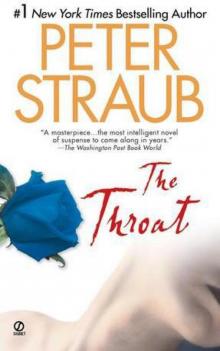 The Throat
The Throat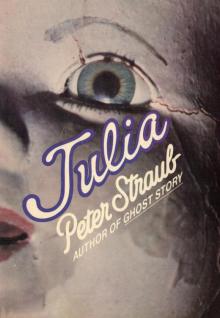 Julia
Julia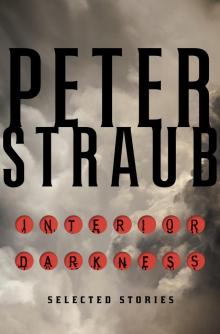 Interior Darkness: Selected Stories
Interior Darkness: Selected Stories A Dark Matter
A Dark Matter Floating Dragon
Floating Dragon Houses Without Doors
Houses Without Doors Mr. X
Mr. X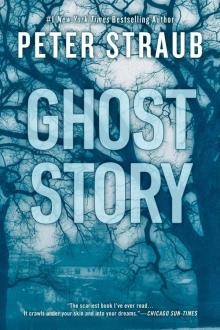 Ghost Story
Ghost Story Mystery
Mystery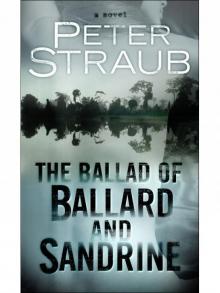 The Ballad of Ballard and Sandrine
The Ballad of Ballard and Sandrine Magic Terror
Magic Terror In the Night Room
In the Night Room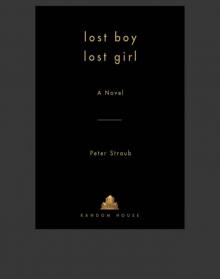 Lost Boy Lost Girl
Lost Boy Lost Girl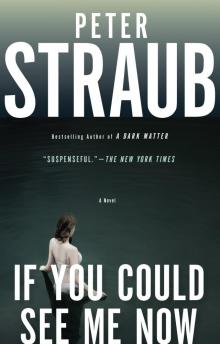 If You Could See Me Now
If You Could See Me Now The Hellfire Club
The Hellfire Club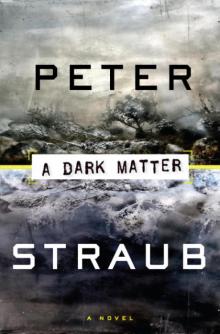 A Dark Matter: A Novel
A Dark Matter: A Novel Koko brt-1
Koko brt-1 Shadowland
Shadowland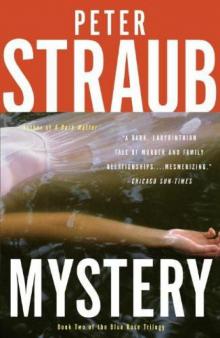 Mystery brt-2
Mystery brt-2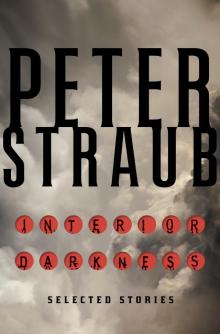 Interior Darkness
Interior Darkness Poe's Children
Poe's Children